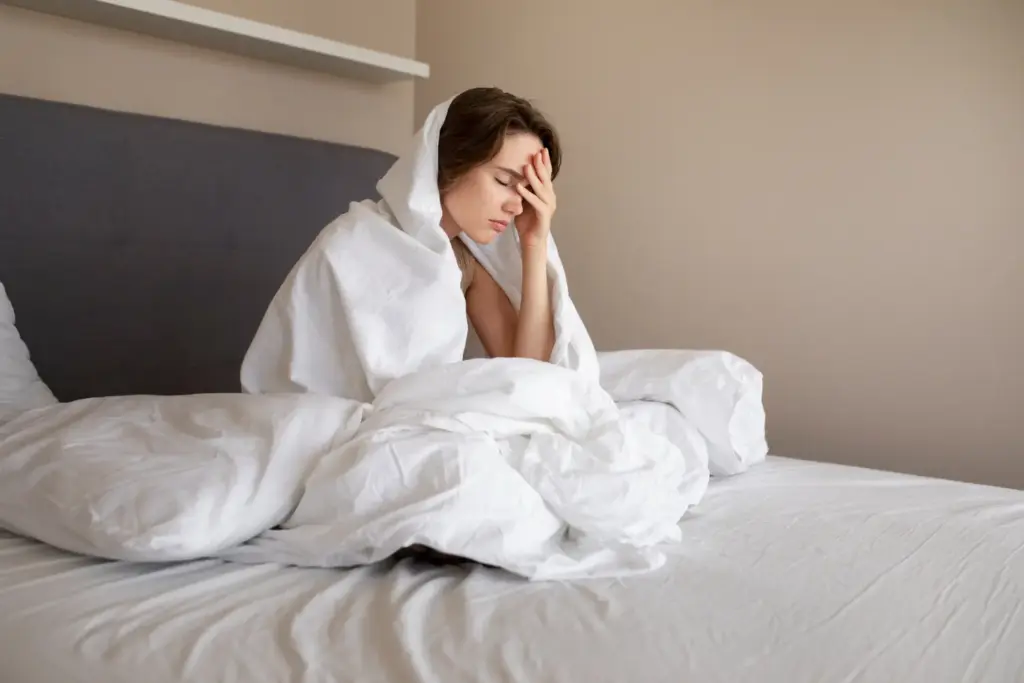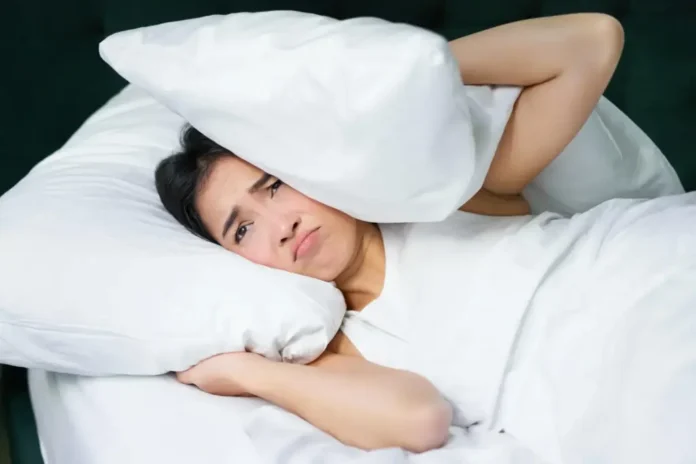Insomnia is a sleep disorder characterized by persistent difficulty falling asleep, leading to inadequate sleep duration. Individuals affected by insomnia often endure poor sleep quality, frequent nighttime awakenings, and daytime fatigue.
Defining “Insomniac”
An “insomniac” refers to an individual diagnosed with insomnia who experiences ongoing challenges in initiating and maintaining sleep. Such individuals struggle to achieve the recommended eight to nine hours of sleep a night, facing fatigue and concentration issues during waking hours.
Recognizing Symptoms
Symptoms of insomnia encompass difficulty falling or staying asleep, daytime tiredness, and impaired concentration. Prolonged or severe symptoms necessitate consultation with a Medical Seek specialist.
Common insomnia symptoms include:
- Difficulty falling asleep at night
- Fatigue upon waking up
- Inability to nap during the day
- Multiple nighttime awakenings
- Early morning awakenings
- Impaired concentration due to tiredness
- Inability to attain eight hours of nightly sleep
When to Seek Medical Attention
While certain insomnia cases stem from factors like travel, stress, or emotional shock and may resolve on their own, persistent symptoms warrant medical attention. If insomnia interferes with daily activities, consulting a healthcare professional is advisable.
Exploring Types of Insomnia
Insomnia can manifest in various forms:
- Acute insomnia: Typically lasting a few days to weeks.
- Transient Insomnia: An extremely short-term type lasting days to a week, possibly indicating an underlying medical condition.
- Chronic insomnia A long-term condition that disrupts sleep three or more nights a week for months.
Causes of Insomnia
Insomnia arises from diverse factors, including:
- Age
- Stress
- Jetlag
- Anxiety
- Depression
- Excessive caffeine
- Medications
- Poor sleep habits
- Night shifts
- Emotional shock
- Underlying medical conditions
Risk Factors for Insomnia
Ignoring insomnia signs can be perilous. Factors elevating the risk include lifestyle habits, emotional stress, jetlag, age (60 and older), medical conditions, medication, and an unsuitable sleep environment.
Complications of Insomnia
Insufficient sleep can lead to complications such as tiredness, anxiety, irritability, depression, memory and concentration issues, gastrointestinal problems, decreased quality of life, and delayed reaction times.
Diagnosing Insomnia
Persistent sleep struggles warrant medical attention. A doctor will conduct a physical examination and inquire about sleep patterns, concentration abilities, and related factors to accurately diagnose the condition.
Insomnia Treatment
Short-term insomnia typically resolves within a week, while prolonged or complex cases may necessitate medication. For those regularly grappling with sleep difficulties, natural remedies from a pharmacy can be considered. Chronic insomnia may require medical intervention.
Treatment Options for Insomnia:
- Acute Insomnia Treatment: This type, often triggered by emotional stress or anxiety, can benefit from going to bed earlier or using over-the-counter (OTC) sleep aids like Melatonin.
- Transient Insomnia Treatment: Although brief, transient insomnia, possibly linked to an underlying medical condition, may require medication as recommended by your doctor.
- Chronic Insomnia Treatment: Medications may be prescribed to alleviate chronic insomnia. Depending on symptoms and history, consulting a psychologist, psychiatrist, or counsellor may also be advised.
Home Remedies for Insomnia

Many instances of insomnia can self-resolve or be managed at home. Consider reducing caffeine intake, avoiding smoking or alcohol before bedtime, and refraining from strenuous exercise or excessive contemplation. Effective home remedies include:
- Mindful Consumption: Limit caffeine, alcohol, and tobacco before bedtime to promote better sleep.
- Improved Sleep Hygiene: Adopt habits before and during bedtime, such as reducing screen time in the bedroom, avoiding phone use before sleep, maintaining a comfortable and dimly lit environment, and balancing room temperature.
- Pharmacy Sleep Aids: Over-the-counter options like Melatonin, Valerian Root supplements, or a few drops of lavender oil under your pillow can assist in inducing sleep.
- Warm Milk or Decaffeinated Tea: Create a sense of comfort before bedtime with warm milk or decaffeinated tea.
Insomnia Prevention
Inconsistent lifestyle patterns and poor sleep habits contribute to insomnia. To prevent this, focus on:
- Consistent Wake Time: Rise at the same time every morning.
- Relaxing Bedroom Environment: Transform your bedroom into a tranquil sanctuary.
- Stress-Free Bedtime: Avoid dwelling on stressful situations close to bedtime and opt for a book over phones or televisions.
- Adequate Time to Fall Asleep: Allow sufficient time to transition from wakefulness to sleep once in bed.
- Avoid clockwatching: Resist the urge to constantly check the time if sleep is elusive.
- Avoid stimulants: Refrain from consuming coffee, alcohol, and tobacco before bedtime.
- Gentle Evening Exercise: Steer clear of intense physical activity close to bedtime.
Remember, your well-being is our priority. Our experts are ready to guide you through a personalized treatment plan with just a simple appointment
Sleepless Nights and What to Do About It
What is insomnia?
Insomnia is a sleep disorder that makes it difficult to fall asleep or stay asleep, even when you have the opportunity to do so. People with insomnia often wake up feeling tired and unrefreshed, even after a full night in bed.
What are the symptoms of insomnia?
Common symptoms of insomnia include:
- Difficulty falling asleep at night
- Waking up during the night and having trouble falling back asleep
- Waking up too early in the morning and feeling unable to fall back asleep
- Daytime fatigue and sleepiness
- Irritability and moodiness
- Difficulty concentrating and focusing
- Headaches
- Muscle tension
What causes insomnia?
There are many different causes of insomnia, including:
- Stress and anxiety: Stressful life events, such as job loss or a death in the family, can trigger insomnia. Chronic anxiety can also make it difficult to sleep.
- Medical conditions: Some medical conditions, such as pain, chronic illness, and sleep apnea, can interfere with sleep.
- Mental health conditions: Depression, bipolar disorder, and post-traumatic stress disorder (PTSD) can all lead to insomnia.
- Medications: Some medications, such as antidepressants and steroids, can have side effects that include insomnia.
- Substance abuse: Caffeine, alcohol, and nicotine can all disrupt sleep patterns.
- Sleep hygiene: Poor sleep habits, such as irregular sleep schedules, napping during the day, and using electronic devices in bed, can contribute to insomnia.
How is insomnia diagnosed?
There is no single test to diagnose insomnia. Your doctor will likely ask you about your sleep habits, medical history, and lifestyle. They may also order some tests to rule out other medical conditions that could be causing your insomnia.
How is insomnia treated?
Treatment for insomnia depends on the underlying cause. In many cases, lifestyle changes, such as good sleep hygiene and relaxation techniques, can be effective. If you have an underlying medical condition, such as depression or anxiety, treating that condition may also help improve your sleep. In some cases, your doctor may prescribe medication to help you sleep.
Additional tips for coping with insomnia:
- Establish a regular sleep schedule and stick to it as much as possible, even on weekends.
- Create a relaxing bedtime routine.
- Make sure your bedroom is dark, quiet, and cool.
- Avoid caffeine and alcohol before bed.
- Get regular exercise, but avoid exercising too close to bedtime.
- See a doctor if your insomnia is severe or doesn’t improve with lifestyle changes.














